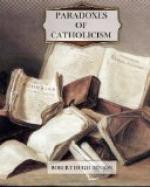For we too, in our measure, have a double nature. As God and Man make one Christ, so soul and body make one man: and, as the two natures of Christ—as His Perfect Godhead united to His Perfect Manhood—lie at the heart of the problems which His Life presents, so too our affinities with the clay from which our bodies came, and with the Father of Spirits Who inbreathed into us living souls, explain the contradictions of our own experience.
If we were but irrational beasts, we could be as happy as the beasts; if we were but discarnate spirits that look on God, the joy of the angels would be ours. Yet if we assume either of these two truths as if it were the only truth, we come certainly to confusion. If we live as the beasts, we cannot sink to their contentment, for our immortal part will not let us be; if we neglect or dispute the rightful claims of the body, that very outraged body drags our immortal spirit down. The acceptance of the two natures of Christ alone solves the problems of the Gospel; the acceptance of the two parts of our own nature alone enables us to live as God intends. Our spiritual and physical moods, then, rise and fall as the one side or the other gains the upper hand: now our religion is a burden to the flesh, now it is the exercise in which our soul delights; now it is the one thing that makes life worth living, now the one thing that checks our enjoyment of life. These moods alternate, inevitably and irresistibly, according as we allow the balance of our parts to be disturbed and set swaying. And so, ultimately, there is reserved for us the joy neither of beasts nor of angels, but the joy of humanity. We are higher than the one, we are lower than the other, that we may be crowned by Him Who in that same Humanity sits on the Throne of God.
So much, then, for our introduction. We have seen how the Paradox of the Incarnation alone is adequate to the phenomena recorded in the Gospel—how that supreme paradox is the key to all the rest. We will proceed to see how it is also the key to other paradoxes of religion, to the difficulties which the history of Catholicism presents. For the Catholic Church is the extension of Christ’s Life on earth; the Catholic Church, therefore, that strange mingling of mystery and common-sense, that union of earth and heaven, of clay and fire, can alone be understood by him who accepts her as both Divine and Human, since she is nothing else but the mystical presentment, in human terms, of Him Who, though the Infinite God and the Eternal Creator, was found in the form of a servant, of Him Who, dwelling always in the Bosom of the Father, for our sakes came down from heaven.
(ii) THE CATHOLIC CHURCH, DIVINE AND HUMAN
Blessed art thou Simon Bar-jona; because flesh and blood hath not revealed it to thee, but My Father Who is in heaven.... Go behind me, satan, for thou savourest not the things that are of God, but the things that are of men.—MATT. XVI. 17, 23.




